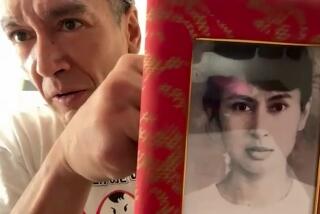Win Tin dies at 84; respected Myanmar opposition leader
YANGON, Myanmar — Win Tin, one of Myanmar’s most respected opposition leaders who was jailed for nearly two decades by his country’s military rulers, died early Monday. He was 84.
His death, attributed to organ failure, came as Myanmar marked the end of Thingyan, the Buddhist New Year, and five weeks after he was admitted to Yangon’s main hospital on the evening of his 84th birthday.
A former journalist who in 1988 co-founded the National League for Democracy Party with his longtime ally, Aung San Suu Kyi, Win Tin was one of the most prominent leaders of the movement to challenge the military junta that ruled what was then known as Burma. He spent 19 years as a political prisoner, believed to be more than any other in Myanmar.
“He was a major figure for our party and he was so, so admired by our people in Burma,” said Soe Win, another former political prisoner, speaking at party headquarters in Yangon, Myanmar’s commercial capital.
Born in 1930 in Yangon, Win Tin had a long career as a journalist that included a 1950s stint with the news agency Agence France-Presse. In 1988 he co-founded the NLD amid an army crackdown on student-led protests against military rule in which an estimated 3,000 were killed and thousands more detained.
The NLD subsequently won elections in 1990, only to be denied office by the military. The army kept Suu Kyi, who would win the 1991 Nobel Peace Prize, under house arrest for 15 of the next 21 years until her release in late 2010.
Win Tin was jailed in 1989 and harshly treated — tortured, denied medical treatment and kept in solitary confinement. He would later recount in a memoir how his jailers refused him pen and paper, so he ground up bits of brick into a paste that he used to write poetry on the walls of his cell.
After his release in 2008 under a general amnesty, Win Tin kept up his stubborn criticism of Myanmar’s government, even after an army-backed civilian administration took office in early 2011. He also found fault with his longtime ally Suu Kyi, describing the NLD as disorganized and saying she had become too cozy with the government.
Those criticisms could resurface in elections scheduled for next year, in which the party led by Suu Kyi is expected to face tough competition from the army-backed Union Solidarity and Development Party of current President Thein Sein.
In his last years as a free man, Win Tin, by then known as a saya, or teacher, to many in Myanmar’s political circles, wore a blue prison shirt, a dress code he said he would not alter until Myanmar no longer held any political prisoners.
Despite Myanmar’s recent political liberalization, protesters have been jailed under a law that requires police permission for public demonstrations, and in recent months several journalists have been imprisoned on charges that include trespassing and breaching a colonial-era state secrets law.
Khin Maung Swe, a prominent former political prisoner and onetime NLD member who in 2010 founded the splinter National Democratic Force Party, described Win Tin as uncompromising in his political outlook.
“We had many heated discussions over the years,” he recalled. “We ended up having different ideas. He wanted the military out of politics immediately. But whether we like it or not, this will not happen overnight,” he said.
Roughneen is a special correspondent.
More to Read
Start your day right
Sign up for Essential California for the L.A. Times biggest news, features and recommendations in your inbox six days a week.
You may occasionally receive promotional content from the Los Angeles Times.






